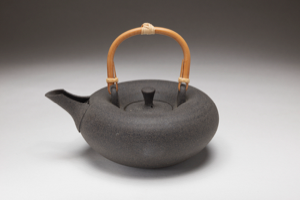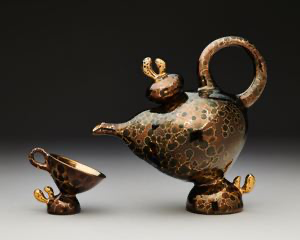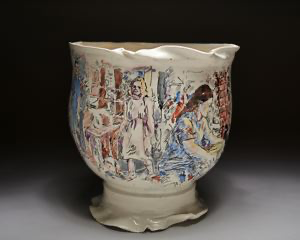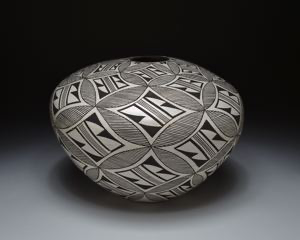| Showing 1 of 1 |
|
John Neely
American
(1953–2025)
Teapot
1986
Stoneware
5.125 x 6.5 x 5.25 in.
Gift of the Nora Eccles Treadwell Foundation
1986.92
John Neely’s artistic production is mainly functional. He is particularly interested in experimental techniques that can be employed in making objects for daily use, such as tableware. An expert in atmospheric firing, he is always looking for new results. Neely’s research led him to invent the train kiln, a new model based on the Japanese anagama kiln, built in a sloping form with a firebox at one end and a flue at the other. It has been adopted by potters all over the world. Neely’s functional production is well represented in the exhibition. Teapots, in particular, are a constant in his work, and the 1986 Teapot is a good example. In form it combines Chinese and Japanese traditions as well as European design.
Born in Leavenworth, Kansas, in 1953, Neely studied at Alfred University and received his master’s degree in fine arts from Ohio University in 1982. An important step in his career as potter was a period that he spent in Japan studying and doing research. While there, he worked in Tokyo for several years, and attended Kyoto University of Arts for two years as a postgraduate research scholar. Since 1984, Neely has been a professor of ceramics at Utah State University. Along with being a renowned potter, he is also an active educator and an innovative and prolific researcher.
Sara Eco Conti, PhD
- Ceramics Niche 3 - John Neely and Jerome Dan Murphy , 1/11/2012 - 5/8/2012
- President's House , 4/15/2017 - 00/00/00
- Unearthed , 8/23/2022 - 5/14/2023
This object is a member of the following portfolios:
Your current search criteria is: Objects is "Teapot".





